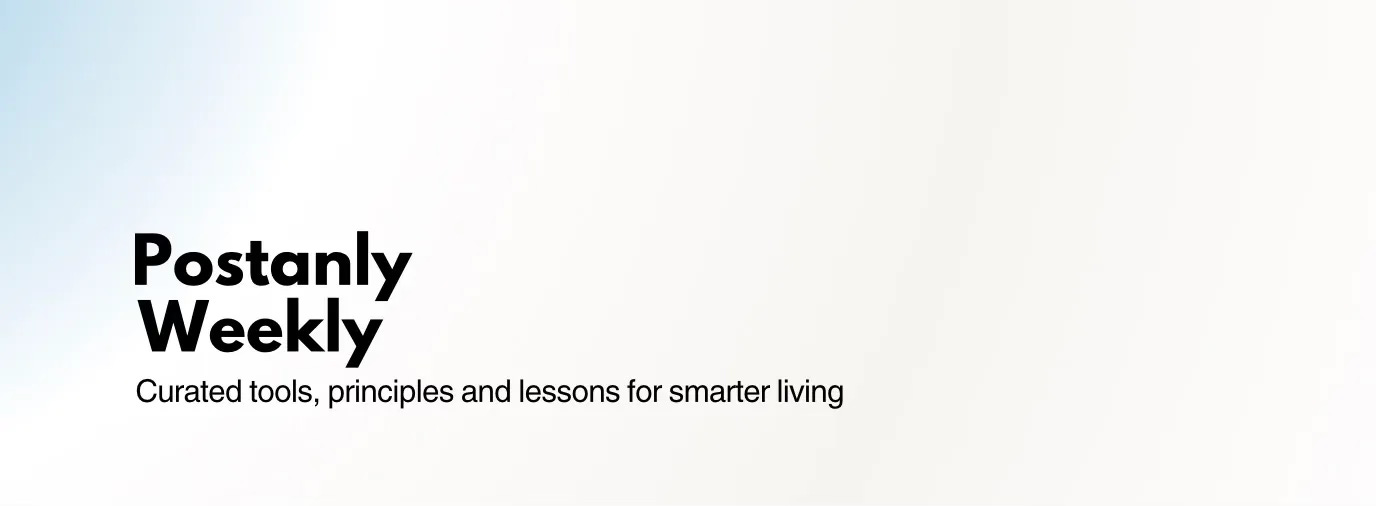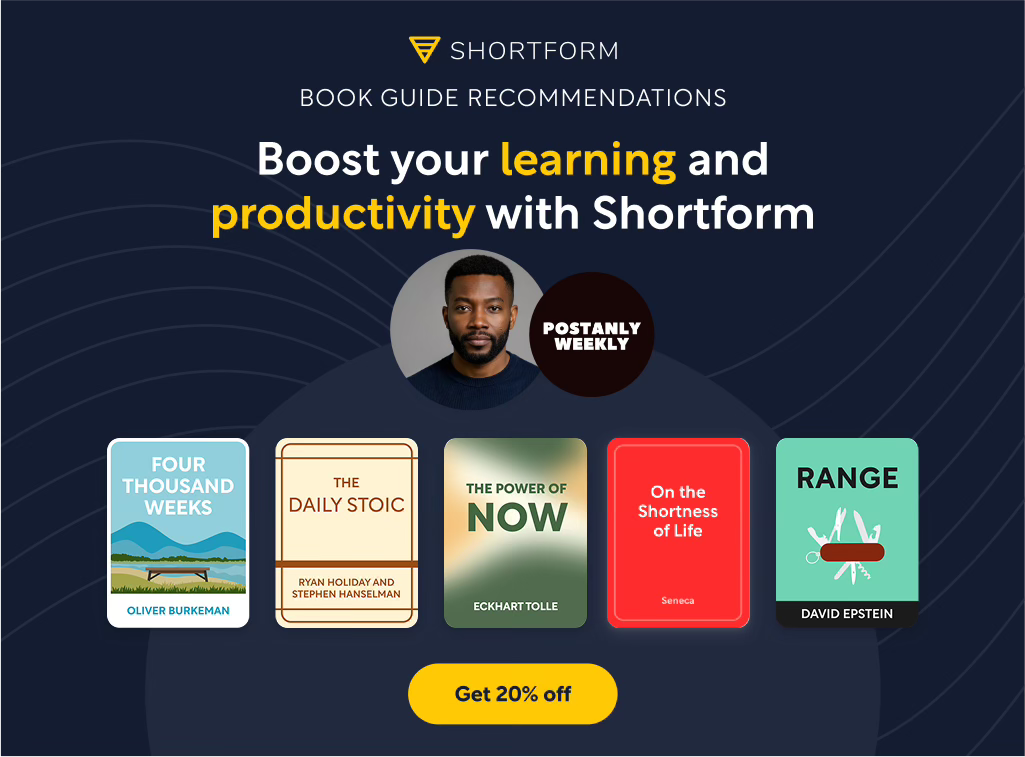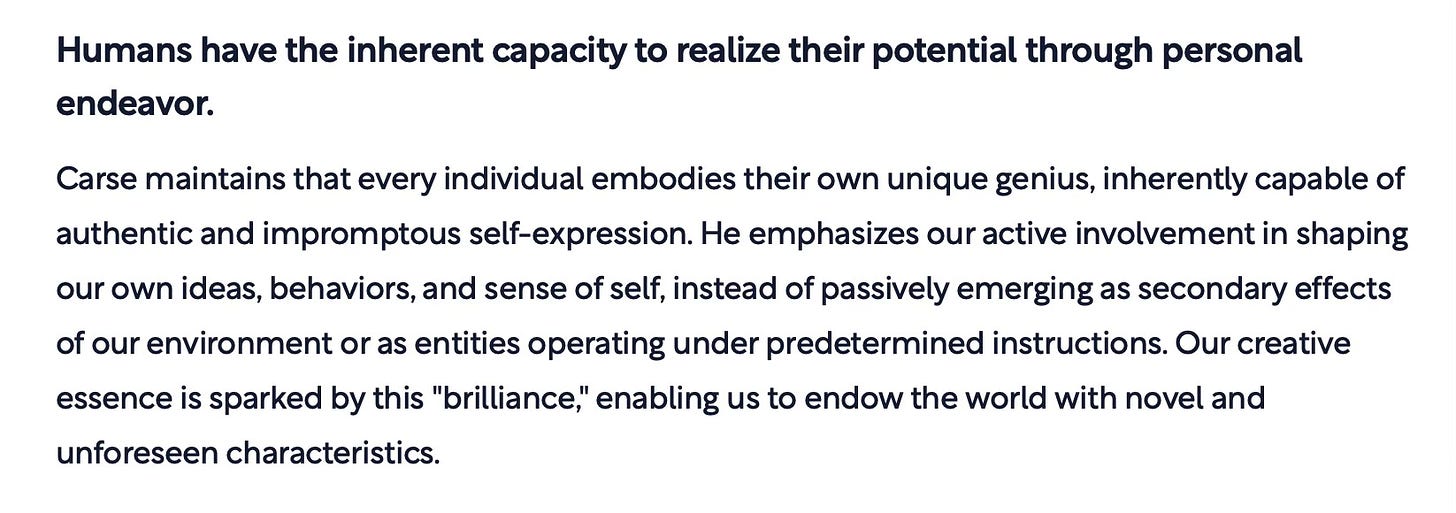Think of a Better Life as a System
Brian Dyson’s Rule For Life is The Most Powerful I’ve Ever Read
Postanly Weekly is a reader-supported newsletter. To support my work, you can upgrade to a paid subscription for $9 per month or $60 for an entire year. Or use this special link for 50% off forever. Plus free access to The Thinking Edge: 27 (with future updates) thinking tools, models, principles for life and career. Inspired by the wisdom of brilliant minds.
Together with Shortform
Self-improvement books are indispensable for personal growth. But their actionable ideas and lessons are not always easy to find. Shortform is an easily digestible solution to this obstacle. The summaries and the vast library of the most impactful self-help books can help you learn and apply wisdom faster.
Shortform distills each book's core ideas with chapter breakdowns, analysis, commentary, and even counterpoints from other sources, allowing you to get the most of books fast. They have all of my favourite books on self-improvement. Shortform doesn’t stop at books. They’ve got guides for articles and podcasts. Experience a new level of personal growth with Shortform.
Postanly readers get a free trial and 20% discount on the annual subscription.
Nature is not random or spontaneous.
It’s a series of systems working in a specific order, according to specific scientific laws. Everything in nature follows a pattern.
The cycle of rain, snow and sunshine are systems.
The human life cycle is a complex system made up of smaller systems working together to keep you alive: respiratory, digestive, immune, nervous, cardiovascular, skeletal system, etc.
There are 11 major organ systems in your body — and they work together harmoniously to keep you alive.
Natural systems evolve — for better or worse.
Since the inception of human life, we have created and continue to design systems to make life easier and better.
On a higher level, systems streamline human political, social, religious, economic and technological progress. Everything around is built like a system: it’s different in every institution or country, but it works to some extent.
What if you think of a better life like a system of habits designed to bring out the best in you? A good personal system can free brain energy for essential things that don’t require structure.
You can build a system for almost any area of your life: work, personal growth, social life, and health.
My writing system allows me to do my best work before 12 noon.
Human energy isn’t endless, so I do my essential tasks first thing in the morning when my brain is fully active. Everything else is done after midday.
I have a system for investing (automatic contributions to a few index funds).
I have also designed a system for managing my health (exercise routines that doesn’t require a lot of thinking).
My system for intellectual growth is still evolving (a set of reading habits, a collection of great books and newsletters that answer specific life questions).
I review the tiny details of the processes every quarter to make sure they are helping me make real progress. When I come across better information, I revise the system accordingly to accelerate progress.
Figuring out good habits, routines, rituals on the fly to build a better life is exhausting and takes a lot of time and brain energy.
Instead of thinking on the fly, build a system that can function without you — a routine that helps you take action without thinking twice about it.
A valuable system for any area of your life takes the significant stress away from getting things done: figuring out the details.
“Habits are really nothing more than systems. They are systems that we created, sometimes subconsciously, to react in specific ways to specific stimuli,” argues Scott Miker.
If high performers can train to demand the best versions of themselves, we can design, create and iterate systems to achieve our goals or build a better life. A good system can help you live your best life intentionally.
A goal gains direction. A system is how to make progress
For every goal (WHAT) you want to achieve, think of a series of habits and routines (the HOW) that can help you accomplish it: the system for making progress.
Schedule the tiny details and steps you need to take every day or week. Commit to that process, focus on making progress ( no matter how small), revise the system when necessary and repeat for as long as possible.
Commitment to the process is the tricky part. If you can make it past the first 30 days, you will lay a solid foundation for accomplishing great things.
Systems reduce the number of decisions you make every day. They get you to take action without wasting time.
A good and reliable system will make your life easier and make you more efficient and effective at what you do. It’s the best way to use brainpower at the right time and for the right tasks.
Life systems are personal. Your goals are unique to you. Your set of repeatable processes will be different from mine. How you design any system for life is up to you. But systems work for almost everyone.
“Goals can provide direction and even push you forward in the short-term, but eventually a well-designed system will always win,” says James Clear.
Every successful life is full of systems — starting today, design a system for spending or investing your limited time, learning something new, getting your best work done, and staying healthy. A better life depends on it.
Build a success engine for life
“A finite game is played for the purpose of winning, an infinite game for the purpose of continuing the play,”writes James P. Carse, in his book, Finite and Infinite Games: A Vision of Life as Play and Possibility.
Highly successful people don’t focus on one massive outcome or goal. They build systems that help them play for as long as possible. Their long-term goal is to compound wins, habits and behaviours.
For great achievers, long term growth is always the goal. Infinite game players aim to learn, evolve and do more of what’s working.
They build a solid success engine that can continue to deliver for many years.
Life is an infinite game: investing in tools and systems to help you build a better future is far more beneficial than playing for quick wins. Infinite game players end up reaping massive results: accumulated gains.They are the most successful, top performers and high achievers. For long term success in any area of your life, invest in processes you can use repeatedly.
“A successful harvest is not the end of a gardener’s existence, but only a phase of it. As any gardener knows, the vitality of a garden does not end with a harvest. It simply takes another form. Gardens do not “die” in the winter but quietly prepare for another season,” James P. Carse explains.
Choose to play a much better game your future self will be proud of. The possibilities of an infinite game are endless.
A concept worth understanding
Heuristics
Heuristics are like mental shortcuts our brains use to make quick decisions.
Daniel Kahneman explained how the apply in many areas of life in his best-selling book “Thinking, Fast and Slow”. They're handy because they help us navigate our daily lives efficiently, but they can also lead us astray.
For example, when I'm in a hurry at the grocery store, I often rely on the heuristic of choosing a familiar brand rather than carefully comparing all the options.
It saves time, but I might miss out on a better deal or tastier product.
In life we use heuristics to decide who to trust or what route to take to work. They're like a double-edged sword – helpful in a pinch, but sometimes we need to slow down and think things through. Heuristics are fascinating because they're all about simplifying complex decisions. Another common one you might relate to is the "availability heuristic." This is when your brain relies on the most readily available information to make a judgment.
So, if you've recently heard a lot about shark attacks, you might become overly cautious about swimming in the ocean, even if the actual risk is quite low. It's like our brains are wired to overreact to what's fresh in our minds. Think about how you decide what news to consume. People often click on headlines that grab your attention, and that's a form of the "affect heuristic."
You're influenced by your emotional reaction to the news rather than a rational evaluation of its importance. It's quick and easy, but it can lead to biased information consumption. So, in your daily life, be aware of these mental shortcuts and sometimes consciously slow down to make more informed choices.
Free post on Medium
>Brian Dyson’s Rule For Life is The Most Powerful I’ve Ever Read
Last year, I missed many experiences with the rest of my family. Work was on fire. Deadlines were tight. And I convinced myself that my presence wouldn’t make a difference. I still regret it. Former Coca-Cola CEO Brian Dyson once said something that changed how I live.
Book of the week
In Finite and Infinite Games, author James P. Carse introduces a provocative distinction between games with defined endings and those without a conclusion. He argues that much of life involves participating in these different types of activities—competitive situations bounded by strict rules and limitless endeavors of creativity and mutual growth.
Shortform summary highlight:
New: I’ve built something special for you.
A 27 day email course on thinking clearly.
You get 27 (plus future updates) powerful thinking tools, models, principles for life and career. Inspired by the wisdom of brilliant minds.
…All for just $27.
The Thinking Edge is a comprehensive toolkit to expand your mental models. These thinking tools do not tell you what to think but how thinking tools can help you think clearly.
“I basically load my head full of mental models.” — Naval Ravikant
AND
A 21 part newsletter course on doing habits right.
All the tools, habits, systems and methods that work in all areas of your life. In it I’ll cover things like:
The kaizen core. Small wins, big changes.
The psychology of micro-change.
Habit architecture: build once, repeat forever
Turning unconscious patterns into conscious leverage.
Why goals don’t work without systems.
I will show you how to bridge the disconnect between want and do.
The feel good method for building better habits.I’ve used the kaizen system to write books, build digital businesses and get through tough times. The secret? Keep the bar laughably low, then clear it every day. Use these systems to stack those wins daily?
Get started today. In the spirit of Kaizen, pay what you can, for now. You choose the price that works for you.
My new books on doing life right (for free or donate what you want)
Personal growth tools I use
> Brain food, delivered daily — Every day Refind analyses thousands of articles and send you only the best, tailored to your interests. Loved by 530,181 curious minds. Subscribe for free.
> Newsletters to enhance your learning — This is a summary of thought leaders and publications. Productivity, finance, healthy-living, self-improvement, career growth and more. Discover newsletters.
Until Next Week,
Be Well.
Thomas
“You only live once, but if you do it right, once is enough.” —Joe Lewis
Postanly Weekly is a reader-supported newsletter. To support my work, you can upgrade to a paid subscription for $9 per month or $60 for an entire year. Or use this special link for 50% off forever. Plus free access to The Thinking Edge: 27 (with future updates) thinking tools, models, principles for life and career. Inspired by the wisdom of brilliant minds.





Insightful 🙌 we talk of the same stuff so you are recommended to any one who subscribes to me!!!!👌let’s spread the word of the good